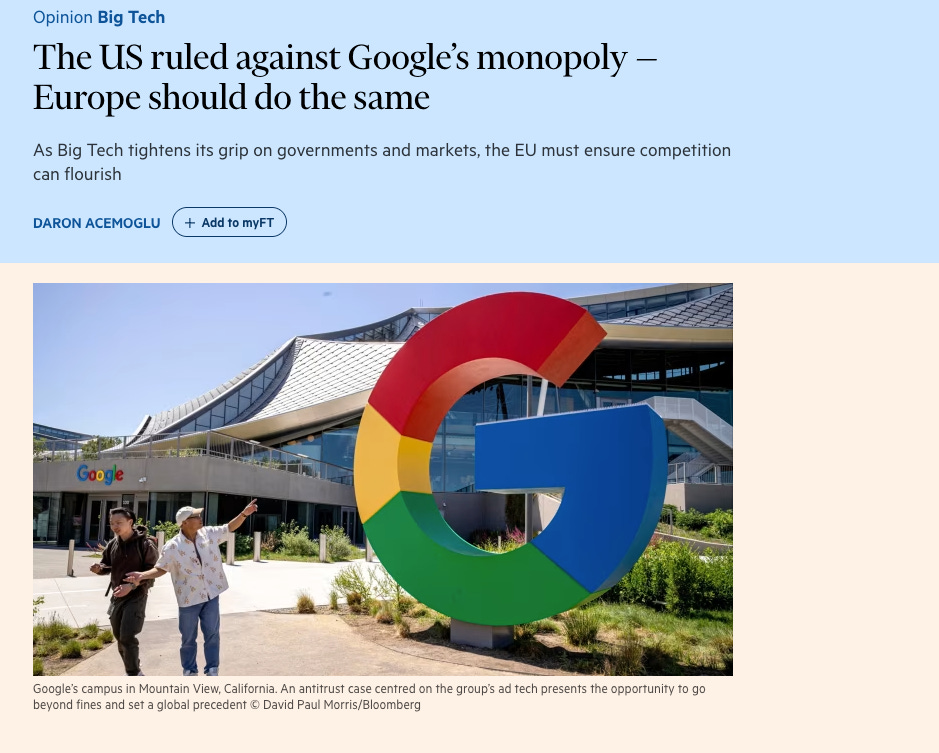Beyond Breakups: Building Smarter Rules to Tackle Big Tech Power
The real challenge is not the size of successful tech firms per se, but how their scale is leveraged — whether to support vibrant ecosystems or to entrench monopolistic control
We can chase monopolies from crisis to crisis, applying ever-larger sanctions once harm is visible — or we can build rules that prevent harmful concentration while allowing digital ecosystems to thrive
In a recent Financial Times essay, Daron Acemoglu forcefully argued that the United States and Europe must act against the monopolistic grip of Big Tech. He rightly highlights how concentrated digital markets can corrode democracy, stifle innovation, and starve independent journalism.
His call for stronger antitrust enforcement — including corporate breakups and punitive taxes — resonates at a time of mounting concern over the unchecked power of dominant platforms.
Yet if we are serious about promoting sustainable innovation and competition, our response must go beyond ex-post remedies like fines and structural separations. Experience shows that breakups, while sometimes necessary, are blunt and uncertain tools. Innovation, particularly in the digital economy, thrives on scale.
The real challenge is not the size of successful tech firms per se, but how their scale is leveraged — whether to support vibrant ecosystems or to entrench monopolistic control.
In Europe, we are pursuing a different strategy that may offer a stronger foundation for restoring competition.
At Bocconi University’s Institute for European Policymaking (IEP@BU), together with scholars from the Toulouse School of Economics, we have recently published a report proposing a more forward-looking approach: not just punishing abuses after they occur, but setting clear ground rules ex ante to prevent dominance from becoming abuse.
Our message is simple: innovation needs rules that empower — not simply interventions that dismantle.
The Digital Markets Act (DMA), now being implemented across the European Union, embodies this philosophy. It does not condemn success or punish scale. Instead, it identifies core platform services where "gatekeepers" — companies with entrenched intermediation power — must comply with specific obligations to ensure fair competition.
These include prohibitions against self-preferencing, obligations to enable interoperability, and transparency requirements in digital advertising markets. Importantly, the DMA is calibrated: it targets only those players whose market control risks tipping entire ecosystems, while leaving ample space for growth and innovation among smaller competitors.
This framework recognizes that large platforms can drive substantial value — but that without rules, they may also lock markets, marginalize rivals, and erode the foundations of democratic societies.
Rather than waiting years for antitrust investigations to conclude, the DMA aims to prevent anticompetitive behavior from taking root in the first place. It is, fundamentally, a shift from reactive enforcement to proactive governance.
Policy Alternatives to Heavy Fiscal Measures
Acemoglu rightly emphasizes the dangers posed by Google's dominance in digital advertising.
Our research reaches a similar diagnosis: the structure of ad tech markets often funnels disproportionate profits toward intermediaries, to the detriment of publishers and advertisers.
However, where Acemoglu proposes taxation as a primary corrective, suggesting a 50 percent levy on digital advertising revenues above a threshold, we caution that heavy fiscal measures, if poorly designed, can unintentionally entrench existing players.
Taxes may raise costs for entrants and accelerate market concentration, especially if incumbents are better positioned to absorb or pass on the burden.
Opaque pricing structures as well as past experience indicate that the passing on such taxes to advertisers and publishers would be hard to avoid.
Instead, a more nuanced regulatory approach is needed. Our report suggests complementing the DMA’s transparency obligations with standardized data-sharing rules for advertising platforms, so that advertisers can better assess performance and switch providers.
Reducing lock-in, fostering interoperability, and breaking information asymmetries are more likely to sustain competitive pressure over time than punitive taxation alone.
This distinction is crucial. In the digital economy, where network effects and data advantages compound rapidly, regulation must not only constrain abuses but actively lower barriers to entry and expansion. Well-crafted rules can nurture competitive markets without stifling legitimate economies of scale.
History offers lessons: the breakup of AT&T in the United States eventually fostered innovation in telecommunications, but it was the earlier licensing of Bell Labs' patents — an intervention that diffused technological capabilities — that laid much of the groundwork for the digital revolution.
The Fundamental Choice
The European approach is not without its challenges. As our report emphasizes, the DMA’s effectiveness will depend on consistent enforcement, legal clarity, and a willingness to adapt as technologies and market dynamics evolve.
We advocate for streamlining overlapping regulations, clarifying ambiguous provisions, and strengthening coordination across national authorities to avoid fragmentation. Regulation must be firm but predictable, encouraging long-term investment alongside competition.
We also caution that regulatory efforts must look ahead to the next wave of decentralization technologies — blockchain, Web3 applications, and distributed computing networks.
These emerging models offer a chance to rebalance digital markets, but they will require updated legal frameworks that recognize new forms of organization and ownership. Europe’s future competitiveness will hinge on anticipating these shifts, not merely reacting to today's dominant platforms.
The fundamental choice before us is clear. We can chase monopolies from crisis to crisis, applying ever-larger sanctions once harm is visible — or we can build rules that prevent harmful concentration while allowing digital ecosystems to thrive.
Breakups may sometimes be necessary, but they are not a strategy. Empowering competition through smart, forward-looking regulation is.
In this respect, Europe’s model, rooted in constitutional values and market fairness, offers an alternative to the reactive enforcement that has too often defined digital competition policy. It is a model that seeks not just to restrain power, but to channel it toward broad-based innovation and democratic resilience.
Francesco Decarolis
Francesco Decarolis is a Full Professor at the Department of Economics, Bocconi University - Milan. His area of research is Industrial Organization and he mostly works on topics in competition economics, antitrust, market design, public procurement, and the regulation of digital platforms.
He is an IEP@BU fellow.
A IEP@BU Digital Event
Can We Make Digital Platforms’ Algorithms Less Harmful?
Webinar - May 14, 2:30 pm
Click here to register for the webinar
Europe has relied heavily on regulation to protect itself from Big Tech firms. However, regulatory efforts are now encountering limitations, especially as the U.S. administration relaxes its own regulatory stance and increasingly challenges EU policies.
Given these shifting political dynamics, how can the EU effectively manage the influence of Big Tech platforms while fostering European digital platforms that better serve societal interests?
The recent IEP@BU report, Rules That Empower, highlights a significant limitation in current regulatory frameworks, noting that while regulations attempt to minimize harm caused by digital platforms, they have inadvertently stifled innovation.
The IEP@BU Policy Brief Certification of Business Practices and Algorithms of Digital Platforms proposes an innovative approach aimed at curbing harmful practices by dominant platforms. It also seeks to incentivize emerging platforms whose practices align closely with the public interest.
Platforms undergoing voluntary certification could thus distinguish themselves competitively, potentially pressuring dominant platforms to revise their practices to maintain market share. Regulators could, if necessary, eventually mandate certification for dominant platforms.
The upcoming IEP@BU digital event will further explore this policy brief and its implications.
Two of the authors, Dovev Lavie and Tommaso Valletti, will present their proposals. Luca Aguzzoni (European Commission) will provide feedback from a policymaking perspective, while Mariateresa Maggiolino (IEP@BU and co-author of "Rules That Empower") will serve as a discussant.
SPEAKERS:
Luca Aguzzoni: Head of Sector, DMA team, DG CNECT, European Commission
Dovev Lavie: Professor of Management, Department of Management and Technology, Bocconi University
Mariateresa Maggiolino: Full Professor of Antitrust Law, Bocconi University
Tommaso Valletti: Professor of Economics, Imperial College Business School
The IEP@BU Mission
Founded by Bocconi University and Institute Javotte Bocconi, the Institute for European Policymaking @ Bocconi University combines the analytic rigor of a research institute, the policy impact of a think tank, and the facts-based effort of raising public opinion’s awareness about Europe through outreach activities. The Institute, fully interdisciplinary, intends to address the multi-fold obstacles that usually stand between the design of appropriate policies and their adoption, with particular attention to consensus building and effective enforcement.
The Institute’s mission is to conduct, debate, and disseminate high-quality research on the major policy issues facing Europe, and the EU in particular, its Member States and its citizens, in a rapidly changing world.
It is independent of any business or political influence.
The IEP@BU Management Council
Catherine De Vries, IEP@BU President
Daniel Gros, IEP@BU Director
Sylvie Goulard, IEP@BU vice-President, Professor of Practice in Global Affairs at SDA Bocconi School of Management
Silvia Colombo, IEP@BU Deputy Director
Carlo Altomonte, Associate Professor at Bocconi University and Associate Dean for Stakeholder Engagement Programs at SDA Bocconi School of Management
Arnstein Assve, Professor in Demography at Bocconi University
Valentina Bosetti, professor of Environmental and Climate Change Economics at Bocconi University
Elena Carletti, Dean for Research and Professor of Finance at Bocconi University
Eleanor Spaventa, Professor of European Union Law at Bocconi Law School










